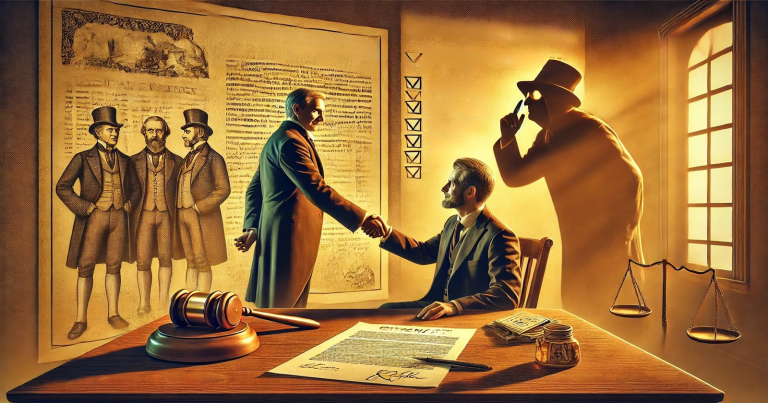The agency theory originated from economic and organizational studies, which try to understand the individual or entity relationship in which one member, the principal, gives the assigned task to another, the agent. The significant aspect of this theory is the conflict of interest between these parties and how one can align their motives with incentives. It has evolved over the years and has become very widely applied in economics, finance, corporate governance, and management. The history of agency theory is based on the classical theories of economics and has been modified by various scholars. It is intended to handle the agency problem in agency theory; sometimes, agents do not act in the best interests of principals. This article covers the historical context and the early founders of agency theory and how the subject evolved into modern economics as we know it today.
Origin of Agency Theory
There is an entire field of study of “agency theory,” which is a culmination of decades of theories in economics and management. The agents act on behalf of principals,s demonstrated even in ancient trading when merchants assigned agents to execute business. This concept of the agency kept evolving until it reached a systematic theory that can now describe what occurs in an agency relationship under various conditions.
Early Agency Theory: Some Theoretical Foundations
Early agency theory has its origins in the classical economic thought of the Eighteenth century in Adam Smiths work. In Wealth of Nations (1776), Smith noted how managers (agents) do not usually act in the interests of owners of companies (principals). It was called one of the earliest accounts of the origins of principal-agent problems. Although he did not develop a formal course in agency theory, his work dramatically emphasized the risks of delegation and conflicts of interest.
His subsequent development was from another eminent contributing economist, Karl Marx, who later discussed the division of labor and how it changed the power structure in organizations. So, The labor division became the baseline for agency theory and this was a huge inspiration for the upcoming economist and theorist in management.
The Agency Theory Development
Agency theory was developed at certain critical points in history. For instance, Ronald Coas studied costs and firm structures at the beginning of the 20th century, creating the historical basis of the agency costs theory. Agency cost, incurred in ensuring that agents act in favor of principals, became the backbone of the theory. By the mid-20th century, other scholars such as Berle and Means (1932) studied how corporate structures resulted in an alienation between ownership and control in firms. They gave insights into the historical background of agency theory as their analysis showed that big corporations would have managers pursuing objectives incompatible with those of shareholders, generating agency problems and calling for mechanisms to align interests.
Agency Theory First Application
Stephen Ross, back in the 1970s, is credited as the first scholar to formalize agency theory into a concept. With Ross’s agency models, he could explain such relationships in financial markets. Around the same time, Jensen and Meckling (1976) extended such a theory by defining agency cost and forming a framework concerning reducing conflicts among principals and agents. These contributions remain critical both for an understanding of agency relations.
Evolution of Agency Theory
As a result, the evolution of agency theory changed economic thought, and made a fine point in corporate governance. The theory, from its earliest paper to its 21st-century applications has driven some huge shifts in how we do business, financial markets and management approaches.
Principal-Agent Model Origin
The principal-agent model can be traced back to mathematical models developed by economists in the twentieth century. These models analyze how incentives, contracts, and monitoring mechanisms can reduce agency problems. Most importantly, a principal sets up rewards and penalties to maintain that the agent will act in his best interests. This model finds application in finance, healthcare, and public administration.
Among many scholars, the following are significant actors responsible for the shaping up of agency theory: Stephen Ross introduced formal mathematical agency models; Jensen and Meckling defined agency costs and proposed means of resolving conflicts; Berle and Means studied corporate control and its impact on shareholders; and Ronald Coase-researched the firm structure and nature of economic transactions. These contributions led to the agency theory’s emergence as a dominant framework in financial and management studies.
Classical Agency Theory
Classical agency theory focuses primarily on the principal-agent relationship in business and finance. Over time, this has spread into new areas of application.
- Corporate Governance: This has been applied to design board oversight and executive compensation.
- Finance: This explains how shareholders ensure that managers maximize firm value.
- Public Sector: This has been used to improve the accountability of government agencies. The theory continues to develop and has impacts on policy and business decisions around the world.
Relevance to ACCA Syllabus
The ACCA syllabus makes examinations on the emergence of agency theory so as to create linkage between shareholders and management (Jensen & Meckling 1976). Agency costs are added into the theory to illustrate the misalignments caused by the separation of ownership and control of corporations. It is central to corporate governance, financial management, audit and assurance. The reason why agency theory is essential for ACCA candidates is because the issues pertaining to ethics, performance appraisal and risk management that are integral to the organization are reflected in agency theory.
Origin of Agency Theory ACCA Question
Q1: In corporate governance, what does agency theory most focus on?
A) Maximize shareholder wealth
B) Interests of Management and Shareholder Are Aligned
Tax Compliance
D) Reducing operational costs
Ans: B) Managerial and shareholders interest are aligned
Q2: What did agency theory identifies to lead to conflicts between manager and shareholder?
A) Varying sets of accounting standards
B) Individual differences (Knowledge gap and different objectives).
C) Strict corporate governance regulations
D) Not having the funds
Ans: B)Incomplete information and conflicting interests
Q3: What do companies to reduce agency for financial management problems?
A) Pay-for-no-performance: more pay, no performance
B) Reward schemes for performance
C) Constraints on managerial autonomy
D) Ignoring shareholders concerns
Ans : B) Performance based incentive schemes
Q4: An agency cost occurs in a situation where:
A) Dividend payments
B) Audit fees
C) Employee salaries
D) Investment in new projects
Ans: B) Audit fees
Q5: How is a key aspect of agency theory facilitated by corporate governance?
A) Align management interests with those of shareholders
B) Reducing company taxes
C) Increasing debt financing
D) Expanding market share
Ans: A) Making sure management acts in the interest of shareholders
Relevance to US CMA Syllabus
It is included in the US CMA Syllabus because it will give students an exposure to the role of the financial manager as an agent of the owner of the company. 1. — CMA Curriculum Agency theory — Corporate governance, performance management, internal controls Therefore, well-implemented management accounting practices are crucial in solving agency conflicts and improving decisions.
Origin of Agency Theory US CMA Question
Q1: How is agency relationship defined in finance management?
A) Contractual business arrangement between two firms
B) A relationship between a principle and an agent that acts on the principle’s behalf
C) An agreement relationship between employees with suppliers
Ans: B) Principal-agent relationship
Q2: Which of the following is NOT a means of mitigating agency problems?
A) Executive stock options
B) Putting a restriction to managerial decision making
C) Viewing through the lens of board oversight
D) Salary tied to performance
Ans = B) Constraints to managerial decision making
Q3: What part do financial controls play in easing agency conflicts?
A) Through the un-voting of shareholders
B) Balance sheet to notice2 and apparent
C) By preventing competition in the market
D) by expaning executive rule
Ans: B) Providing transparency in the financial reporting
Q4: What causes agency costs to arise in corporations?
A) Because of the separation of ownership and control
B) Many cities where taxes are high and people are polite
C) Because of poor logging of transactions
D) Due to restrictions imposed by the government
Ans: A) Because of division of ownership and management
Q5: In what ways does corporate rate governance provide a solution to agency conflicts?
A) Saboteur independence and transparency of Board
B): Restricting financial reporting
C) Eliminating company debts
D) Covid containment measures
Ans: A) Greater independence and transparency of the board
Relevance to CFA Syllabus
The origin of the agency theory is part of the CFA exam content and provides a useful framework for understanding conflicts of interest between corporate managers (the agent) and the company’s shareholders (the principal). OFTEN TESTABLE: Agency theory as it relates to corporate finance, portfolio management and ethical issues fundamental in CFA candidates’ studies of governance frameworks that align mgmt outcomes with investors. It is helpful in risk assessment, investment decisions, and financial analysis.
Origin of Agency Theory CFA Questions
Q1: What are the Are agency problem in the companies?
A) The shareholders get eaten first, followed by the personal goals of managers
B) Shareholders’ Interest comes First Insted of Managerial Arbitation
C) The prices of stocks keep on flater over a period of time
D) We don’t need corporate governance
Answer: (A) Managers work in their own best interest rather than optimizing for shareholders
Q2: An agency cost is defined as which of the following?
A) Management vs Shareholder cost
Option B – The Cost of Issuing New Shares
C) Cost of gaining market share
D) The tax on company profits
Ans: A) Cost of conflict between management and shareholders
Q3: Identify a corporate governance mechanism that reduce agency conflicts?
B) A independent board of directors
B) Reducing executive compensation
C) Through abolishing money accounting
D) The rising burden of debt
Ans: A) Board of Directorse. Independent
Q4: Why is agency theory relevant for investment decisions?
Answer A) What shareholders do to ensure their capital is not squandered
B) It prevents corporations from paying dividends
C) It restricts companies from fundraising
D) It applies only for accounting policies
Ans: A) It demonstrates how shareholders protect their investment
Q5: How do shareholders reduce agency problems in publicly traded corporations?
A) Expanding voting rights to stockholders
B) By reducing the people’s salaries
C) By limiting company size
D) Same: The corporate governance practice of letting a matter fall.
Ans: A) Expanding stockholder voting rights
Relevance to US CPA Syllabus
Accountants By the same token, CPAs conflict to uncover any potential agency issues, as they audit financial statements that may be falsely provided and/or misstated in an effort to conceal any potential fraud or mismanagement.
Origin of Agency Theory US CPA Questions
Q1: What is agency theory essentially about?
A) Shareholders vs Managers
B) For tax purposes, the structure of corporations
C) The professional obligations of accountants
D) Formation of financial statements
Ans: A) distinction between owners and managers
Q2: In agency theory, the cost of monitoring management behaviour.
A) Audit fees
B) Advertising expenses
D) Research & Development Expenses
D) Depreciation
Ans: A) Audit fees
Q3: How does external auditing address agency conflicts?
B) Ensuring that the financial statements are correct and free of bias
B) Giving up on being part of financial reporting
C) By means of restrictions on management compensation
D) And when you give people unlimited discretion in how they want to manage
Ans: A) Financial statements are free from error and bias
Q4: What would mitigate agency risk?
A) The six goals on internal controls and governance
B) Reduced compliance with regulations
C) Elimination of shareholder meetings
D) Limiting financial disclosures
Ans: A) Establishing strong internal controls & governance
Q5: Why is agency theory important to financial auditing?
A) It shows the impact of Auditors on how they reduce the movements on the illegal payment
B) Restricted knowledge needed for financial reporting
C) It seeks to slash at managerial discretion
D) It is not for small businesses
Ans: A) It talks about the role of auditors in thwarting financial mismanagement


